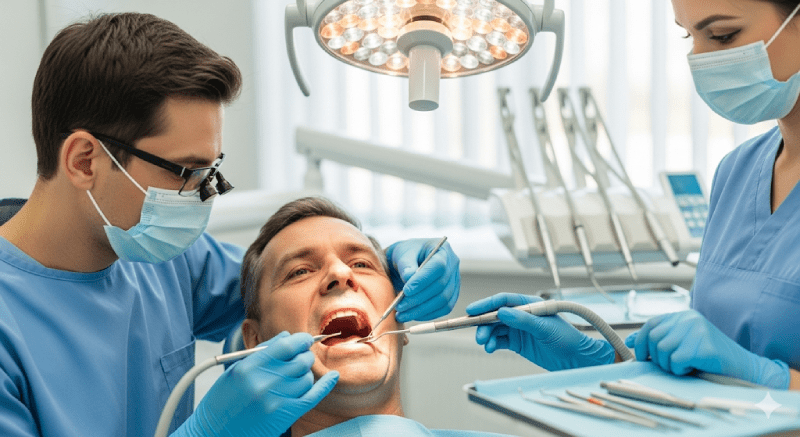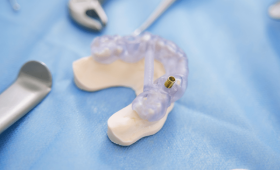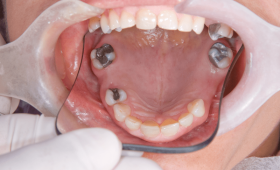What are Dental Implants and Why are They Important?
Dental implants are artificial tooth roots, usually made of titanium, that are surgically placed into the jawbone to replace missing teeth. These structures provide a solid foundation for the placement of a prosthetic tooth (crown).
Implants not only provide an aesthetic smile but also restore chewing function, improve speech ability, and prevent the jawbone from deteriorating. This is of vital importance for preserving bone health, especially in cases of long-term tooth loss. Clinics in Antalya offer world-class services with their expertise and high-tech equipment in this field.
Why is Antalya a Popular Choice for Dental Implant Treatment?
Antalya is a globally recognized destination for dental tourism. It brings together high-quality dental clinics, experienced and internationally trained dentists, and modern technology to provide first-class services to patients.
The cost of treatment here is more economical compared to many countries in Europe and North America. In addition, patients have the opportunity to combine their treatment with an enjoyable holiday experience. These advantages offered by Antalya make it an attractive option in terms of both finance and comfort, and allow patients to confidently choose this city.
What are the High-Quality Dental Implant Brands?
High-quality dental implants are generally brands that are supported by scientific research and have proven long-term success. Brands like Straumann, Nobel Biocare, and Osstem are among the most preferred worldwide.
These brands guarantee the biocompatibility, durability, and integration success of the implants with the bone. Quality brands often offer a lifetime warranty, protecting the patient’s investment. Before starting treatment at a clinic, it is critical to learn which implant brand will be used and why it is preferred to make a safe choice.
What Factors Affect Dental Implant Prices?
The price of dental implant treatment varies depending on multiple factors. The implant brand and quality used is one of the most important factors determining the price. Premium brands are generally more expensive. In addition, the patient’s jawbone condition and the need for additional treatments (e.g., bone grafting or sinus lifting) can increase the cost.
The number of implants and crowns to be placed, the material of the crown (porcelain, zirconium), the dentist’s experience, and the clinic’s technological infrastructure are other factors that play a role in pricing. Therefore, it is important to request a detailed cost analysis before starting treatment.
Is Implant Treatment a Painful Process?
Dental implant treatment is generally performed under local anesthesia, so the patient does not feel any pain during the procedure. Patients usually only feel a slight pressure or vibration. After the procedure, mild pain, swelling, or bruising is normal.
However, pain relievers and ice pack applications recommended by the dentist can easily help you manage these discomforts. Most patients find the implant operation less uncomfortable than a tooth extraction. Thanks to advanced anesthesia techniques and modern surgical methods, the treatment process has become quite comfortable.
How Long Does Implant Treatment Take to Complete?
Implant treatment can be completed in different durations depending on the patient’s condition. The placement of a single implant usually takes 15-30 minutes. However, the process of the implant fusing with the jawbone, called osseointegration, can take 3 to 6 months. After this process is completed, it may take a few more weeks to place the crown.
In some cases, a temporary prosthesis can be placed in a single session with special techniques such as All-on-4. In complex cases, the treatment process may be extended due to additional procedures such as bone grafting. You need to have an individual consultation with your dentist for a complete duration estimate.
What is Bone Grafting (Bone Powder) and When is it Necessary?
Bone grafting is a procedure applied when the jawbone does not have sufficient density or volume to support the implant. Bone loss can occur after a long period of tooth loss or after a tooth extraction. In this case, bone volume is increased using a special material called bone powder to ensure that the implant can be placed safely.
This procedure is critical for guaranteeing the success and longevity of the implant. The graft material can be obtained from the patient’s own body, from human or animal sources, or synthetically, and it encourages the formation of new bone.
What is Sinus Lifting and Why is it Done?
Sinus lifting is a surgical procedure applied in cases of bone loss that occurs when the sinus cavity sags downwards after the extraction of the molars in the upper jaw. In this situation, there is not enough bone height to place an implant. In the sinus lifting procedure, the sinus membrane is carefully lifted upwards, and bone graft material is placed in the created space to ensure new bone formation. This creates the necessary basic condition for the safe placement of the implant. The healing process after the procedure can take a few months, and after this process is completed, the implant placement procedure is started.
Who is the All-on-4 Implant Technique Suitable For?
The All-on-4 implant technique is an ideal solution for patients who have lost all their teeth or whose remaining teeth need to be extracted. This technique allows for a full dental prosthesis to be fixed by placing only four implants in the upper or lower jaw.
Since the posterior implants are placed at an angle, bone grafting is usually not necessary. This method is a great advantage, especially for patients with low bone density. The All-on-4 technique allows for a temporary prosthesis to be placed on the same day, enabling patients to get a new smile immediately and offering aesthetically and functionally satisfying results.
How Should Care Be Taken After Implant Placement?
Proper care after implant placement is critical for the success and longevity of the treatment. Within the first 24 hours, you should avoid hot food and drinks and eat soft foods. Applying a cold compress as recommended by your dentist will reduce swelling.
You should pay the utmost attention to oral hygiene; however, you should avoid brushing or gargling the treated area on the first day. It is important to use the antibiotics and pain relievers prescribed by your dentist regularly. Smoking and alcohol consumption should be avoided as they negatively affect the healing process.
How Long Do Dental Implants Last?
Dental implants can last a lifetime with proper care and regular check-ups. The longevity of the implant depends on the patient’s oral hygiene, regular dental visits, and overall health. Keeping the gum and bone surrounding the implant healthy is essential to maintain the implant’s stability. Insufficient oral care can lead to an infection called peri-implantitis around the implant, which can lead to the loss of the implant. Therefore, it is very important for patients who have had implants to visit their dentists for professional cleaning and check-ups every 6 months.
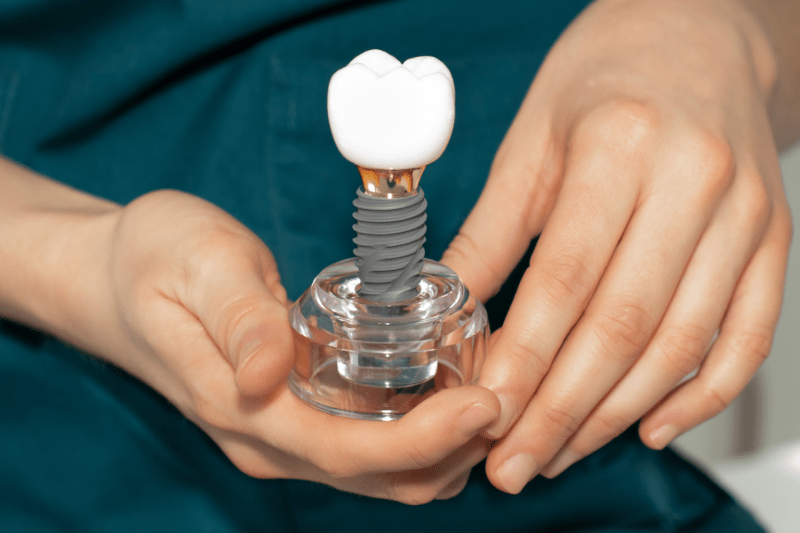
Who Cannot Have Implant Treatment?
Dental implant treatment may not be suitable or may be risky for individuals with certain chronic health conditions or habits. Uncontrolled diabetes, blood clotting disorders, diseases that weaken the immune system, and conditions affecting bone metabolism such as advanced osteoporosis can jeopardize the success of the implant.
Excessive smoking and alcohol consumption also negatively affect the healing process. Patients who have had radiotherapy to the head and neck area are also at risk. Therefore, your dentist will conduct a detailed assessment of your overall health and decide whether you are suitable for the treatment.
Should an Implant be Preferred for a Single Missing Tooth?
Yes, in cases where a single tooth is missing, a dental implant is the best and most conservative treatment option. In traditional bridge treatment, the healthy teeth on either side of the missing tooth must be reduced and used to support the prosthesis.
This leads to the irreversible loss of healthy tooth structure. An implant, on the other hand, solves this problem by placing an artificial root in place of the missing tooth without touching the adjacent teeth. This way, both healthy teeth are preserved and the most natural aesthetic and functional result is achieved.
Why are Zirconium Crowns Preferred?
Zirconium crowns are an increasingly popular material for prostheses placed on dental implants. These crowns stand out with their aesthetic appearance that closely resembles natural teeth. Thanks to their high light translucency, they offer a natural and transparent look, eliminating the gray line seen in metal-supported crowns.
Zirconium is also an extremely durable, biocompatible, and non-allergenic material. It shows high resistance to chewing forces and is long-lasting. Thanks to these features, it offers a superior solution in terms of both aesthetics and function.
Is There a Risk of Implant Failure?
Although dental implant treatment has high success rates, there is a rare risk of failure. These risks are usually due to factors such as poor oral hygiene, uncontrolled diabetes, excessive smoking, or the implant failing to fuse with the bone. The development of infection around the implant (peri-implantitis) can also cause failure. In such cases, the implant may need to be removed. To minimize the risk of failure, it is vital to choose the right clinic and an experienced dentist, and to follow all instructions before and after the treatment.
Do Impacted Wisdom Teeth Affect Implant Treatment?
Yes, in some cases, impacted wisdom teeth can affect implant treatment. If the implant is to be placed in the posterior region and the position of the impacted tooth is close to the implant placement area, this can complicate the surgical procedure. The impacted tooth may need to be removed. Before treatment, your dentist will use a panoramic X-ray or tomography to evaluate the position of the impacted tooth and how it may affect the implant treatment. In necessary cases, removing the impacted tooth before the implant is placed can be an important step for the success of the treatment.
What Foods Should I Avoid After Implant Treatment?
After implant treatment, it is important to pay attention to your diet, especially for the first few days. Within the first 24 hours after the procedure, you should avoid hot food and drinks, as they can increase bleeding. For the first few days, you should eat soft and warm foods. Soups, yogurt, pureed vegetables, and fruits are ideal during this process. You should avoid hard, sticky, or crunchy foods (such as nuts, chips) until healing is complete. Such foods can put pressure on the implant area and make healing difficult.
Do Implant Crowns Change Color?
Dental implant crowns do not change color like natural teeth. Especially high-quality materials such as zirconium and porcelain are not affected by colored substances like coffee, tea, or cigarettes and do not stain. This allows the implant teeth to maintain their aesthetic appearance for many years.
Since your natural teeth may change color over time, it may be recommended that you avoid professional teeth whitening or have this procedure done before the implant to maintain the harmony of your implant crowns with your natural teeth.
Can Implant Treatment Stop the Bone Loss Caused by Toothlessness?
Yes, dental implants are the most effective method for preventing and stopping the bone loss caused by toothlessness. Tooth roots constantly stimulate and keep the bone alive by applying chewing forces to the jawbone.
After a tooth is extracted, this stimulation disappears, and the bone begins to deteriorate over time. The implant acts as an artificial tooth root, transmitting chewing forces back to the jawbone and stimulating the bone. This way, bone loss is stopped or greatly slowed down, helping to preserve facial features and prevent possible future problems.
What is the Best Time for Implant Treatment in Antalya?
Any time of the year is suitable for implant treatment in Antalya. However, if you want to combine the treatment with your holiday plans, spring and autumn are generally more ideal. The weather is milder and tourist density is lower during these periods, which can make both your travel and recovery process more comfortable. As long as your treatment plan and communication with the clinic are arranged in advance, you can start the treatment at any time, regardless of the season.
Is Implant Treatment Suitable for Smokers?
Smoking is one of the most important factors that negatively affect the success of implant treatment. Smoking slows down the healing process and increases the risk of infection by reducing blood flow and disrupting the bacterial balance in the mouth.
Therefore, dentists generally recommend that you quit smoking or at least minimize its use before and after implant treatment. The failure rate in smoking patients is higher than in non-smokers. Quitting smoking is the best approach for lasting success.
Is Implant Care Different from Natural Teeth?
Implant care is similar to that of natural teeth but may require some special products and techniques. Plaque can also build up around implants, so regular brushing and flossing are essential. Special products such as superfloss or an interdental brush may be recommended to clean around the implant. Getting professional cleaning at regular intervals as recommended by your dentist will keep the tissues around the implant healthy and prevent possible infections.
Are Swelling and Bruising Normal After Implant Treatment?
Yes, mild to moderate swelling and bruising are completely normal after implant surgery. This is a natural reaction of the body to the surgical procedure and usually peaks within the first 24 to 48 hours, then gradually decreases. Applying a cold compress as recommended by your dentist helps to minimize swelling and bruising. For the first few days after the procedure, sleeping with your head elevated can also help reduce swelling. If there is a worrisome situation, you should definitely contact your clinic.
Can Dental Implants Get Gum Disease?
Dental implants themselves do not decay, but the tissues around the implant can get a gum disease called peri-implantitis. Peri-implantitis is an inflammation of the gum and bone surrounding the implant and occurs due to poor oral hygiene. This condition can lead to the deterioration of the bone around the implant and consequently the loosening of the implant. Therefore, it is of vital importance for patients who have had implants to pay the utmost attention to their oral hygiene and to go for regular dental check-ups to prevent such diseases.
What Age Range is Suitable for Implant Treatment?
There is no upper age limit for dental implant treatment, but the patient’s overall health must be good and their jawbone development must be complete. It is generally suitable for individuals who have reached the age of 18 and whose bone development is complete. In elderly patients, the success rate is similar to that of young patients as long as their overall health and bone density are sufficient. The main determining factor is not chronological age but the patient’s physiological condition and bone health.
Can Implant Treatment be Done Under General Anesthesia?
Dental implant treatment is usually performed under local anesthesia, but in some cases, general anesthesia or sedation may be preferred. These situations include when the patient experiences extreme anxiety, a large number of implants need to be placed at the same time, or a complex surgical procedure is required. General anesthesia ensures that the patient is completely asleep during the procedure and prevents them from feeling any pain or anxiety. This option increases patient comfort, especially for procedures that will take a long time. You should ask your clinic if they offer such options.
How Strong is the Chewing Function of Implants?
Dental implants provide a very strong and stable chewing function as they transmit chewing forces directly to the jawbone, just like natural teeth. Implants absorb and distribute the force felt during chewing just like natural teeth. This allows patients to comfortably eat hard or difficult-to-chew foods. Compared to dentures, implants restore chewing ability almost 100%, which significantly improves the patient’s quality of life.
What Does it Feel Like in the Mouth After Implant Treatment?
After implant treatment, there may be a slight feeling of strangeness in the mouth for a temporary period. This feeling is related to the adaptation of the implant and crown to the mouth structure and usually disappears within a few days or weeks. When the implant has completed the healing process, your new tooth will feel completely natural. A properly placed and designed implant feels just like a natural tooth, which allows patients to easily accept their new teeth.
What is the Fundamental Difference Between an Implant and a Bridge?
The most fundamental difference between an implant and a bridge is the effect of the treatment methods on the adjacent teeth. In bridge treatment, the healthy teeth on either side of the missing tooth are reduced to be used as support for a bridge. This leads to an irreversible loss of healthy tooth structure. An implant, on the other hand, functions as an independent artificial root and does not harm the adjacent teeth, thus protecting them. Implants also prevent bone loss in the jawbone, while bridges cannot solve this problem.
Is it Necessary to Consult More Than One Clinic for Implant Treatment?
Yes, it is always a good idea to get a second opinion from more than one clinic, especially for a complex or costly treatment plan. Different dentists’ approaches, the implant brands they use, and treatment costs can vary. Getting a second opinion helps you confirm the accuracy of the treatment plan and choose the most suitable clinic for you. You can make the best decision by comparing the dentists’ experience, the technologies they use, and patient testimonials.
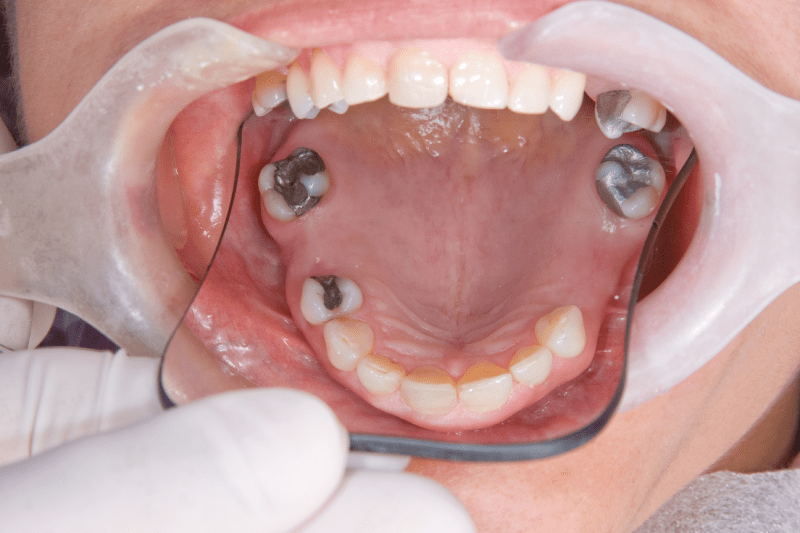
What Happens to the Teeth to be Extracted Before Implant Treatment?
If a tooth extraction is necessary before implant treatment, this procedure can usually be performed before or during the same session as the implant placement. The healing of the empty space after the tooth extraction and the bone being ready for the implant are awaited.
During this process, the patient can use a temporary prosthesis for their aesthetic and functional needs. In some cases, bone powder is immediately applied to the empty space after extraction to prepare the ground for implant placement.
Does Implant Treatment Address Aesthetic Concerns?
Dental implant treatment provides a revolutionary improvement in aesthetic appearance by replacing missing teeth. Gaps in the front teeth, in particular, can seriously affect a person’s smile and self-confidence. Zirconium or porcelain crowns placed on implants offer a flawless aesthetic appearance by mimicking the color, shape, and size of natural teeth. This not only addresses aesthetic concerns but also helps preserve a person’s facial features and achieve a youthful appearance.
What Are the Steps for Dental Implants in Antalya?
Diagnostic stage: During this phase, our professional implant dentists in Antalya examine the patient, ask questions concerning his or her state of health and preferences. After that we make a dental panoramic X-ray, and formulate the diagnosis. An additional medical examination may be performed if necessary. Then doctors come up with a treatment plan, select the most suitable implant brand, and decide on the implantation process for the patient.
Preparatory stage: At this point, our dentists conduct a thorough examination: they perform a CT, take lab tests, make sure there are no contraindications, and, if necessary, consult with allied specialists. During this stage, doctors also perform oral cavity sanitation, and, if necessary, treat the gum and mucous membrane diseases to prepare them for the high quality implantation process in Antalya.
Dental implant surgery in Antalya: Implants get installed under local anesthesia, and the whole procedure takes 1-2 hours. The implantation can be combined with tooth extraction (both procedures are performed on the same day).
Impression pickup: Once the artificial roots are installed, they get covered by transition elements called abutments. After that, such elements will be used to hold the implants.
Implantation: Placing dental implants generally takes 1-1.5 hours (depending on the complexity of the case). Implants get immediately loaded with a temporary acrylic denture that perfectly imitates the aesthetics of the natural teeth.
Osseointegration: The implants should establish well in the bone, and this process takes 3-4 months on average. So, you have to come back to Antalya for the second phase of the treatment.
Installation of permanent dental implants: After the osseointegration is completed, the temporary acrylic denture gets replaced with a permanent ceramic or zirconia prosthesis. It is definitely painless. It serves for many years, features stunning aesthetics, and enables you to eat any food you wish.
How many visits do tooth implants in Antalya necessitate?
Implant therapy typically takes three days: the first day for consultation, the second day for implant surgery, and the third day – two days later – for follow-up. Because the time it takes for the bone to fuse to the implant differs depending on the patient’s bone condition, a follow-up appointment 3-6 months later will be required for the attachment of crowns and, if necessary, bridges.
Is there a limit to the number of implants a person can have?
For a healthy mouth, there is no limit to the number of implants that can be placed. However, replacing an implant for each tooth is not recommended; instead, an implant can be used to replace many teeth utilizing bridgework.
Who is eligible for dental implants in Antalya?
Adult patients of all ages can benefit from implants, but older people are more likely to request them. Due to inadequate bone development, implants are not indicated for patients under the age of eighteen. Patients with diabetes should notify us before having implant surgery since they will need a blood test for Haemoglobin A1C before we can treat them. The body will reject the implant if the diabetic patient’s blood sugar levels are extremely high.
